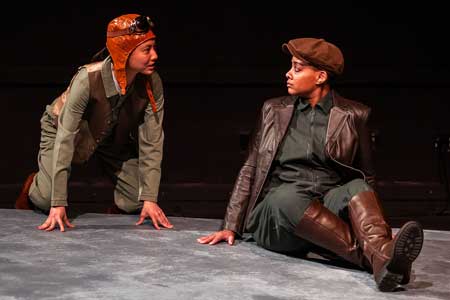Play
by LM Feldman
Directed by Larissa Lury
Created by LM Feldman and Larissa Lury
A Catalyst Collaboriative@MIT Production
Central Square Theater
Central Square, Cambridge, MA
January 30 – February 23, 2025
With Barlow Adamson (JFK, Anfuso, Lovelace, Testing Officials, NASA Rep), Valencia Proctor (Bessie Coleman, Irene Leverton), Monica Risi (Christina Hernández, Jerri Sloan), Mitra Sharif (Jasmin Moghbeli, Jean Hixson), Catharine K. Slusar (Jackie Cochran, Gene Nora Stumbough), MK Tuomanen (Sally Ride, Geraldyn Cobb), Kaili Y. Turner (Mae Jemison, Jane Hart), Hui Ying Wen (Hazel Ying Lee, Wally Funk, Ivy Rieker)

in “Space”
Photo: Nile Scott Studios
Courtesy of Central Square Theater
The play opens with a beautiful quietude – darkness, embellished by a delicately designed soundscape, eventually filled with one character, then by many. The poetic dimensions of space are set from the outset in this multifaceted production which soon focuses intensively and fairly comprehensively on the involvement and plight of women as potential and actual astronauts in the early space programs sponsored by NASA. Depicted as historic figures from different eras are a whole roster of amazing women whose bios are nicely portrayed in an exhibit in the lobby and detailed in the full online program of the show. Simply reading through these bios is inspiring enough, but the play does an estimable job of dramatizing their varied talents and dispositions.
Mae Jemison (Kaili Y. Turner), born in 1956, and the first Black woman in space, stands as the main poetic voice of the play, representing not only her own significant accomplishment and landmark as an astronaut, but something of a prophet who began a continuing, and still vital, initiative called The 100 Year Starship to create interstellar travel within the next 100 years. Turner gives a sense of sweep, energy and vision to this focal role.
There are twenty different roles in the play and many of the actors play two, and sometimes three or more roles, which makes following of the specific histories and narratives a bit of a challenge at times. But, one gets a sense of the general time frames and issues involved, and losing some of the particular tracks of the narrative is not a major issue.
Bessie Coleman (Valencia Proctor), born in 1892, was the first African American woman to hold a pilot’s license, receiving it after going to a French flight school since American ones did not admit women or Black people at the time. A daring stunt pilot who demonstrated her grit and determination forcefully, Coleman tragically died young. Proctor delivers a moving and quietly penetrating portrait.
In a double set of focal roles, MK Tuomanen renders both Geraldyn Cobb, born in 1931, and Sally Ride, born in 1951. Cobb was a record holder for all sorts of things, including non-stop long distance flight. As well, she worked as a humanitarian pilot and received the Nobel Peace Prize in 1981. Sally Ride, of course, was the first American woman in space in 1983. Notes for the production also make mention that Ride was homosexual, which was not revealed until after her death of cancer in 2012. Tuomanen gives both of these roles force and distinction, conveying these powerful characters clearly and effectively.
The theme of the Mercury space program and the associated but ultimately ill-fated Women in Space program form the major historical focus of the play and depict the various contributing personalities related to the issues that surrounded the life and death of that program. As President John Kennedy, who championed the early space program, Barlow Adamson does a good job, considering that he has to carry five other roles as well, all of which he does very well, though sometimes, because of this mix and shift of roles, it’s a little difficult to tell who he is at any given time. But he is very clearly Kennedy and also very clearly Randy Lovelace, the physician and NASA consultant who initiated testing for candidate women astronauts and championed the Women in Space program in the early 1960s. Lovelace was the one who invited Geraldyn Cobb, and then nineteen other women, to take astronaut fitness tests in hopeful preparation for full involvement in the space program.
Jackie Cochran, born in 1906, an accomplished pilot and the director of the Women Airforce Service Pilots (WASP) in World War II and in many ways the grand dame of the group, represents a complicated figure in political terms vis-à-vis the Women in Space program, as the play details. Catharine K. Slusar gives her a convincingly regal and an appropriately self-possessed interpretation, astutely domineering and unrelenting.
In other roles, Monica Risi as Christina Hernandez, a Mexican-American born in 1991, gives a good sense of the more recent generation of participants in the space program, as does Mitra Sharif as Jasmin Moghbeli, born in 1983, an Iranian-American NASA astronaut. As Hazel Ying Lee, born in 1892, the first Chinese American woman to earn a pilot’s license, Hui Ying Wen does a fine job as well.
Many issues converge in this stimulating and suggestive production. The history of prejudice vis-à-vis
women and minorities is a significant theme, and the ups and downs of the Women in Space program are detailed quite convincingly. As well, there is a speculative and poetic dimensions which reflects on the possibilities of science and technology yet to be seen, enabling humans to venture into distant parts of space with the facility we have only encountered in science fiction. As a multi-dimensional treatment and as a work containing an abundance of characters, there is a daring degree of disparateness in the narrative, but overall the theme is moving and compelling and this troupe carries it forth with a positive and engaging sense of ensemble and energy.
– BADMan (aka Charles Munitz)
Leave a Reply